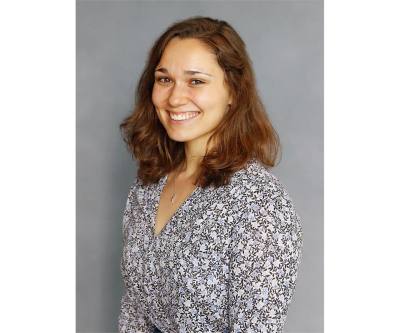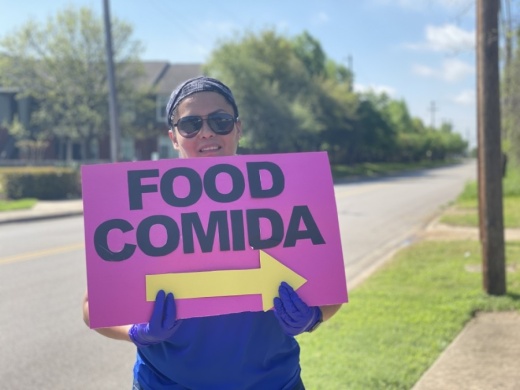The Caring Place is a community-based nonprofit in Georgetown that helps provide for basic human needs, O’Connor said. The organization oversees two thrift stores, The Shops at The Caring Place and Second Helping; operates a food pantry; and assists with rent, utilities, medical needs and transportation.
At the onset of the coronavirus pandemic in Central Texas, area nonprofits were forced to close their doors in an effort to mitigate the virus’s spread. The decision was difficult, O’Connor said, especially given that COVID-19 has put people in increasingly vulnerable situations.
“It’s hard to be out of business,” O’Connor said. “People really need our services. And with so many people applying for unemployment and so many people being financially impacted by the pandemic, you can’t help but be eager to open for the community.”
The Caring Place temporarily closed its doors March 14, quickly modifying the food pantry to a no-contact, drive-thru model. Since March 17, the nonprofit has dedicated its resources to providing food to those in need while working on a timeline to safely reopen its facilities to the public.
Similarly, Habitat for Humanity of Williamson County suspended operations March 18, said Nicole Vommaro, the nonprofit’s resource development director. Habitat for Humanity’s two ReStores, located in Round Rock and Georgetown, were forced to shut down, and all physical donations and volunteer efforts were temporarily suspended.
The financial impact of shutting down Habitat for Humanity’s ReStores, Vommaro said, was significant. The ReStores collect approximately $10,000 each week, which then go back into operational costs to run the organization.
Habitat for Humanity launched a financial campaign to help raise money during the pandemic, Vommarro said, and has received nearly $50,000 to date. Vommaro added the nonprofit has also been named a recipient of both the federal Paycheck Protection Program and Wilco Forward, a Williamson County-based small-business relief program.
“We've been blessed by the community of our donors, volunteers and long-term supporters, and then also just through these grants,” Vommarro said, adding Habitat for Humanity has also applied for several coronavirus response funding opportunities.
Beyond immediate operational expenses, Vommaro said increasing emphasis has been placed on Habitat for Humanity’s Habitat homeowners, or those living in homes built by the nonprofit. Vommaro said staff has sent out letters to each homeowner, encouraging them to reach out if any job losses or financial hardships occur.
Some Habitat homeowners have been living in their homes for up to 21 years, Vommaro said. Her central priority has been on making sure they know there are resources at their disposal, she said.
“We wanted to make sure that those folks were able to stay in their homes,” she said. “We reached out to them to basically let them know, 'We're here. Please let us know if you have a loss of job, loss of income and if you're going to have any struggles paying your mortgage, because we want to be able to assist with that.'”
In recent weeks, Vommaro said the Georgetown ReStore has been able to reopen for limited “personal shopping experiences,” or 30-minute scheduled time slots when people can come into the shop to pick up essentials. Vommaro added Habitat for Humanity is working to duplicate the personal shopping appointments at its Round Rock ReStore within the coming days.
Vommaro said the nonprofit is also working to launch an ecommerce website for shopping Habitat for Humanity’s restores, a digital alternative to its in-person experiences.
“A couple of weeks ago when we started doing the personal shopping experiences in Georgetown, that has enabled us to bring in some income back into the organization as we maintain closure of the stores,” Vommarro said. “And now this online restore is another opportunity for us to provide a sales opportunity for the public to shop the restore online.”
Both Vommaro and O’Connor said while navigating the coronavirus pandemic has been difficult with each of their nonprofits, the public response has been resounding. The financial contributions of residents, along with those who have raised awareness through word of mouth, have helped keep them afloat, O’Connor said.
“We've gotten a lot of gratitude from people who have financially given because they've been really grateful that we've been able to continue to provide food,” O'Connor said. “And then also those folks who have received the food—you know, they are just very grateful to be able to access it.”
While distributing food in mid-April, O’Connor said she met a woman who had not left her house for an entire month. With many people physically unable to shop safely due to food insecurity and health vulnerabilities, O’Connor said the mission of The Caring Place is as timely as ever.
“I'm just kind of overwhelmed by people's understanding and kindness and generosity and people wanting to help,” O’Connor said. “They want to help their neighbors, and they know that’s why we’re here, and that's what we're all about.”





